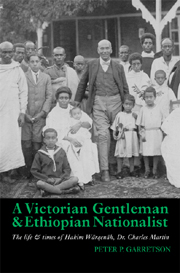 A Victorian Gentleman and Ethiopian Nationalist
A Victorian Gentleman and Ethiopian Nationalist Book contents
- Frontmatter
- Contents
- List of Illustrations
- Transliteration
- Note on the Ethiopian Calendar
- Glossary
- Acknowledgements
- Map 1 Ethiopia 1900–1950
- Map 2 Burma 1898–1919
- Introduction
- 1 Youth & education
- 2 Return to Ethiopia (1896–1901)
- 3 Campaigning in the Ogaden & return to Burma (1901–1907)
- 4 Transitions in life
- 5 A man of substance in Ethiopia & Burma
- 6 Return of a progressive to Addis Ababa (1919–1924)
- 7 An increased pace of modernization (1924–1930)
- 8 International diplomacy, education & recruitment
- 9 Governor of a model province, Chärchär (1930–1935)
- 10 Ethiopian ambassador to the Court of St. James (1935–1936)
- 11 London & India
- 12 Ethiopia
- Conclusion
- Bibliography
- Index
2 - Return to Ethiopia (1896–1901)
Published online by Cambridge University Press: 05 April 2013
- Frontmatter
- Contents
- List of Illustrations
- Transliteration
- Note on the Ethiopian Calendar
- Glossary
- Acknowledgements
- Map 1 Ethiopia 1900–1950
- Map 2 Burma 1898–1919
- Introduction
- 1 Youth & education
- 2 Return to Ethiopia (1896–1901)
- 3 Campaigning in the Ogaden & return to Burma (1901–1907)
- 4 Transitions in life
- 5 A man of substance in Ethiopia & Burma
- 6 Return of a progressive to Addis Ababa (1919–1924)
- 7 An increased pace of modernization (1924–1930)
- 8 International diplomacy, education & recruitment
- 9 Governor of a model province, Chärchär (1930–1935)
- 10 Ethiopian ambassador to the Court of St. James (1935–1936)
- 11 London & India
- 12 Ethiopia
- Conclusion
- Bibliography
- Index
Summary
On March 1, 1896 Ethiopia defeated the Italians at the Battle of Adwa, perhaps the single most important event in modern Ethiopian history. News penetrated even to the small town of Katha in northern Burma where Wärqenäh was district medical officer. Then and there he decided to return to Ethiopia in order to help take care of the casualties from the first war between Ethiopia and Italy. During the second war between these two very different countries from 1935 to 1941, he would play a much more significant role. In both wars, he was forced to think deeply about where his loyalties lay, whether to Britain and its empire or to Ethiopia. The Ethiopia of his infancy had changed dramatically. When Wärqenäh was picked up on the battleground in Mädäla in 1868, Emperor Téwodros had committed suicide, and the British had successfully invaded and conquered Ethiopia, then swiftly left. Four years of division and brutal civil war followed. Before Wärqenäh returned to Ethiopia thirty-one years later in 1899, Ethiopia had been ruled by three Emperors: Täklä Giyorgis (1868–1872), Yohannes (1872–1889) and Menilek (1889–1913). Täklä Giyorgis came from Lasta in central Ethiopia, Yohannes from Tegré in the north and Menilek from Shäwa in the south. Wärqenäh would become Menilek's personal physician, but he neither knew nor had much contact with the other two emperors, although he named a son Téwodros.
- Type
- Chapter
- Information
- A Victorian Gentleman and Ethiopian NationalistThe Life and Times of Hakim Wärqenäh, Dr. Charles Martin, pp. 23 - 34Publisher: Boydell & BrewerPrint publication year: 2012


